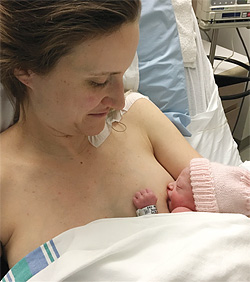Is breastfeeding still possible?
If you’ve had a Caesarean section
Whether you planned to have a C-section or not, there’s nothing to prevent you from breastfeeding soon after your baby is born. Most C-sections are done with an epidural, in which anaesthesia (freezing) is injected near the base of the spine. So you should be able to breastfeed soon after, ideally within an hour of delivery, even if you’re still feeling the effects of the epidural. If you have a general anaesthetic (you are put to sleep during the operation), you’ll be able to breastfeed as soon as you are completely conscious and feeling comfortable. Many hospitals encourage new mothers to nurse for the first time while in the operating room or recovery room.
To keep your baby in your room, you need to have your spouse or someone close to you on hand. The hospital staff can help you start nursing, if necessary. Soon you’ll be able to take care of your baby by yourself. Many dads also enjoy holding the new baby skin-to-skin on their chest. It’s a good way to get the father–child relationship off to a warm start.
If your baby is premature

![]() You can breastfeed even if your baby is premature.
You can breastfeed even if your baby is premature.
Premature babies have special needs and benefit even more from mother’s milk. Breast milk is ideally suited for meeting a premature baby’s needs, and you alone can provide this made-to-order nourishment!
Depending on how far along the pregnancy was at the time of birth, your baby may be fully able to nurse or only able to breastfeed a little bit, if at all. If he’s not yet capable of sucking, the nurses will use a very thin tube to get your milk directly into his stomach.
If your baby’s health allows, hold him often and for long periods with his skin against yours. Your little one will get used to you and your smell, which will make it easier to get him to nurse once he’s ready. This intimate contact has been shown to be beneficial for both babies and their parents. In fact, it is considered as valuable for newborns as the food they receive.
While waiting until your baby is able to breastfeed on his own, you’ll need to use a breast pump to get your milk production started and keep the supply ongoing. Breast pumps are often available in intensive care units, or you can rent one if necessary from a drug store or certain breastfeeding support groups.
The milk that you express can be refrigerated or even frozen until your baby is ready for it. When it’s fed to him, hospital staff may add nutritional supplements, if necessary.
Various factors influence how long it takes before a premature baby is ready to start breastfeeding. Your doctor or nurses will tell you when your child is ready. At first, he may not be able to nurse for very long, so it will probably be a good idea to express milk afterward in order to relieve your breasts and sustain milk production. Little by little, your baby will nurse more effectively and you’ll be able to do without the breast pump.
You’ll need lots of patience and perseverance during this phase: premature babies need time to learn to breastfeed. Most of them become more skilled at it once they reach their original due dates.
A person trained in breastfeeding can provide invaluable support and encouragement. Préma-Québec, an organization for parents of premature infants, may also be able to help.
Préma-Québec
1-888-651-4909 / 450-651-4909
premaquebec.com
If you have twins

![]() Breastfeeding both twins at once can be practical.
Breastfeeding both twins at once can be practical.
New mothers of twins are happy to receive help early on with nursing their babies and caring for them between feedings. The most demanding aspect of mothering twins isn’t breastfeeding itself, but the challenge of caring for two newborns at the same time. So accept all the help you can get!
It’s possible to feed your two babies exclusively on breast milk. The more your breasts are stimulated, the more milk they produce.
If your twins are born prematurely, they’ll benefit even more from your milk. You should pump milk while waiting for your twins to be able to nurse. This will ensure that there’s enough milk for both of them. With twins, one baby is often ready to nurse before the other one is, so keep expressing milk for the second child.
Some women prefer to breastfeed each baby separately. Others find it more practical to nurse both twins at the same time. Most women use a combination of these two approaches.
Generally, mothers of twins nurse each baby at one breast for one feeding and change to the other breast for the next feeding. As babies’ appetites and sucking capacities will vary, this allows equal stimulation for both breasts. There are other approaches that may be more suitable in certain situations.
Some women use mixed feeding, a combination of breastfeeding and bottle-feeding using expressed breast milk and commercial infant formula. A person trained in breastfeeding can put you in contact with a mother who has breastfed twins.
There are organizations or resources that can help you, regardless of where you live.
Mamans Pieuvres
mamanspieuvres.com/allaitement (in French only)
La Leche League
llli.org/news/two-breastfeeding-twins-2/
If you’ve had breast surgery
Milk production varies among women, regardless of whether they have had breast surgery. The impact of such surgery on milk supply also varies from one woman to another. Whatever your situation, learning about breastfeeding and having support can help you get off to a successful start.
Breast reduction (surgery to make the breasts smaller) appears to decrease the breast’s capacity to produce milk. That said, some women who have undergone reductive procedures produce enough milk to breastfeed their babies exclusively for several weeks or more. It may be necessary to monitor the baby’s weight more often during her first weeks of life to make sure that she’s receiving enough milk.
If you aren’t producing enough milk to meet all your newborn’s nutritional needs, you’ll need to supplement feeding with a commercial infant formula.
Breast augmentation appears to have less impact on breastfeeding.
Restarting milk production
If you’ve stopped breastfeeding, didn’t breastfeed your child at birth, or are finding that your baby has trouble tolerating commercial infant formulas, it’s possible to resume breastfeeding regardless of your baby’s age.
With determination—and support from someone trained in breastfeeding—you’ll be able to resume lactation, even if you never nursed your baby.
You’ve adopted a baby? It’s even possible to begin producing milk without having gone through a pregnancy.
If you’re breastfeeding—and pregnant
If you’re newly pregnant and have been breastfeeding, you can continue to nurse. It’s safe for both your fetus and your nursing baby.
If your baby is less than 6 months old, you may not produce enough milk to satisfy her nutritional needs, a situation that could affect her growth. In this case, you may have to supplement feeding with a commercial infant formula.
The hormonal changes that occur in pregnancy affect the composition of milk (reversion to colostrum) and can also reduce your milk supply. Some older babies don’t like these changes and lose interest in breastfeeding.
Express: Pump or squeeze milk from the mother’s breast.
Fetus: Developmental stage of a human being in its mother’s womb, from 10 weeks of pregnancy until birth.


